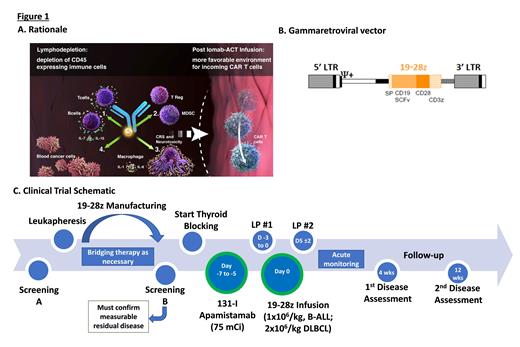Abstract
Background: Autologous CD19-targeted chimeric antigen receptor-modified (CAR) T-cell therapy leads to complete responses (CR) in patients (pts) with (w/) relapsed or refractory (R/R) B-cell acute lymphoblastic leukemia (B-ALL, >80% CR rate) and diffuse large B-cell lymphoma (DLBCL, ~40-55% CR rate). However, following fludarabine/cyclophosphamide (Flu/Cy) conditioning and CAR T-cell therapy w/ a CD28 costimulatory domain (e.g. 19-28z CAR T-cells), rates of grade ≥3 ICANS and grade ≥3 cytokine release syndrome (CRS) in pts w/ R/R DLBCL and morphologic R/R B-ALL exceed 30%. CRS and ICANS are associated w/ considerable morbidity, including increased length of hospitalization, and may be fatal. Host monocytes appear to be the major reservoir of cytokines driving CRS and ICANS post-CAR T-cell therapy (Giavradis et al. and Norelli et al., Nature Medicine, 2018). Circulating monocytic myeloid-derived suppressor cells (MDSCs) may also blunt efficacy of 19-28z CAR T-cells in R/R DLBCL (Jain et al., Blood, 2021).
The CD45-targeted antibody radioconjugate (ARC) 131-I apamistamab is being investigated at myeloablative doses as conditioning prior to hematopoietic cell transplantation in pts w/ R/R acute myeloid leukemia. However, even at low doses (4-20 mCi), transient lymphocyte and blast reduction are observed. Preclinical studies in C57BL/6 mice demonstrate low-dose anti CD45 radioimmunotherapy (100 microCi) transiently depletes >90% lymphocytes, including CD4/CD8 T-cells, B-cells, NK cells, and T-regs, as well as splenocytes and MDSCs, w/ negligible effect on bone marrow (BM) hematopoietic stem cells (Dawicki et al., Oncotarget, 2020). We hypothesized a higher, yet nonmyeloablative dose of 131-I apamistamab may achieve more sustained, but reversible depletion of lymphocytes and other CD45 + immune cells, including monocytes thought to drive CRS/ICANS. We additionally hypothesized this approach (vs Flu/Cy) prior to CAR T-cell therapy would promote CAR T-cell expansion while reducing CSF levels of monocyte-derived cytokines (e.g. IL-1, IL-6, and IL-10), thus lowering the risk of severe ICANS (Fig 1A).
Study design and methods: We are conducting a single-institution pilot study of 131-I apamistamab in lieu of Flu/Cy prior to 19-28z CAR T-cells in adults w/ R/R BALL or DLBCL (NCT04512716; Iomab-ACT); accrual is ongoing. Pts are eligible for leukapheresis if they are ≥18 years-old w/ R/R DLBCL (de novo or transformed) following ≥2 chemoimmunotherapy regimens w/ ≥1 FDG-avid measurable lesion or B-ALL following ≥1 line of multi-agent chemotherapy (R/R following induction/consolidation; prior 2 nd/3 rd gen TKI required for pts w/ Ph+ ALL) w/ ≥5% BM involvement and/or FDG-avid extramedullary disease, ECOG performance status 0-2, and w/ appropriate organ function. Active or prior CNS disease is not exclusionary. Pts previously treated w/ CD19-targeted CAR T-cell therapy are eligible as long as CD19 expression is retained.
See Fig 1B/C: Post-leukapheresis, 19-28z CAR T-cells are manufactured as previously described (Park et al., NEJM, 2018). Bridging therapy is permitted at investigator discretion. Thyroid blocking is started ≥48h pre-ARC. 131-I apamistamab 75 mCi is administered 5-7 days pre-CAR T-cell infusion to achieve total absorbed marrow dose ~200 cGy w/ remaining absorbed dose <25 cGy at time of T-cell infusion. 19-28z CAR T-cells are administered as a single infusion (1x10 6/kg, B-ALL pts; 2x10 6/kg, DLBCL pts).
The primary objective is to determine safety/tolerability of 131-I apamistamab 75 mCi given prior to 19-28z CAR T-cells in pts w/ R/R B-ALL/DLBCL. Secondary objectives include determining incidence/severity of ICANS and CRS, anti-tumor efficacy, and 19-28z CAR T-cell expansion/persistence. Key exploratory objectives include describing the cellular microenvironment following ARC and 19-28z CAR T-cell infusion using spectral cytometry, as well as cytokine levels in peripheral blood and CRS.
The trial utilizes a 3+3 design in a single cohort. If dose-limiting toxicity (severe infusion-related reactions, treatment-resistant severe CRS/ICANS, persistent regimen-related cytopenias, among others defined in protocol) is seen in 0-1 of the first 3 pts treated, then up to 6 total (up to 3 additional) pts will be treated.
We have designed this study to provide preliminary data to support further investigation of CD45-targeted ARCs prior to adoptive cellular therapy.
Geyer: Sanofi: Honoraria, Membership on an entity's Board of Directors or advisory committees; Actinium Pharmaceuticals, Inc: Research Funding; Amgen: Research Funding. Geoghegan: Actinium Pharmaceuticals, Inc: Current Employment. Reddy: Actinium Pharmaceuticals: Current Employment, Current holder of stock options in a privately-held company. Berger: Actinium Pharmaceuticals, Inc: Current Employment. Ludwig: Actinium Pharmaceuticals, Inc: Current Employment. Pandit-Taskar: Bristol Myers Squibb: Research Funding; Bayer: Research Funding; Clarity Pharma: Research Funding; Illumina: Consultancy, Honoraria; ImaginAb: Consultancy, Honoraria, Research Funding; Ymabs: Research Funding; Progenics: Consultancy, Honoraria; Medimmune/Astrazeneca: Consultancy, Honoraria; Actinium Pharmaceuticals, Inc: Consultancy, Honoraria; Janssen: Research Funding; Regeneron: Research Funding. Sauter: Genmab: Consultancy; Celgene: Consultancy, Research Funding; Precision Biosciences: Consultancy; Kite/Gilead: Consultancy; Bristol-Myers Squibb: Research Funding; GSK: Consultancy; Gamida Cell: Consultancy; Novartis: Consultancy; Spectrum Pharmaceuticals: Consultancy; Juno Therapeutics: Consultancy, Research Funding; Sanofi-Genzyme: Consultancy, Research Funding.
131-I apamistamab and 19-28z CAR T-cells are investigational agents in treatment of ALL and DLBCL


